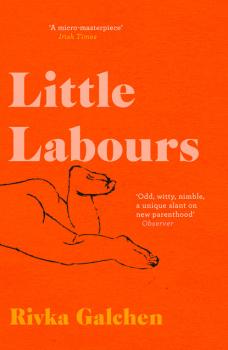ТОП просматриваемых книг сайта:
Rivka Galchen
Список книг автора Rivka GalchenАннотация
AN OBSERVER BOOK OF THE YEARA droll and dazzling compendium of observations, stories, lists, and brief essays about babies.‘Beguiling … A wunderkabinett of baby-related curios … A peculiar book, and astonishing in its effect.’ Boston GlobeOne August day, a baby was born, or as it seemed to Rivka Galchen, a puma moved into her apartment. Her arrival felt supernatural, she seemed to come from another world. And suddenly, the world seemed ludicrously, suspiciously, adverbially sodden with meaning.But Galchen didn’t want to write about the puma. She had never been interested in babies, or in mothers before. Now everything seemed directly related to them and she specifically wanted to write about other things because it might mean she was really, covertly, learning something about babies, or about being near babies.The result is Little Labours, a slanted enchanted miscellany. Galchen writes about babies in art (with wrongly shaped head) and babies in literature (rarer than dogs or abortions, often monstrous); about the effort of taking a passport photo for a baby not yet able to hold up her head and the frightening prevalence of orange as today’s chic colour for baby gifts; about Frankenstein as a sort of baby and a baby as a sort of Godzillas. In doing so she opens up an odd and tender world of wonder.
Аннотация
AN OBSERVER BOOK OF THE YEARA droll and dazzling compendium of observations, stories, lists, and brief essays about babies.‘Beguiling … A wunderkabinett of baby-related curios … A peculiar book, and astonishing in its effect.’ Boston GlobeOne August day, a baby was born, or as it seemed to Rivka Galchen, a puma moved into her apartment. Her arrival felt supernatural, she seemed to come from another world. And suddenly, the world seemed ludicrously, suspiciously, adverbially sodden with meaning.But Galchen didn’t want to write about the puma. She had never been interested in babies, or in mothers before. Now everything seemed directly related to them and she specifically wanted to write about other things because it might mean she was really, covertly, learning something about babies, or about being near babies.The result is Little Labours, a slanted enchanted miscellany. Galchen writes about babies in art (with wrongly shaped head) and babies in literature (rarer than dogs or abortions, often monstrous); about the effort of taking a passport photo for a baby not yet able to hold up her head and the frightening prevalence of orange as today’s chic colour for baby gifts; about Frankenstein as a sort of baby and a baby as a sort of Godzillas. In doing so she opens up an odd and tender world of wonder.
Аннотация
A short-story collection from one of America’s brightest young talents.In one of these intensely imaginative stories a young woman’s furniture walks out on her. In another, the narrator feels compelled to deliver a takeout order that has incorrectly been phoned in to her. In a third, the petty details of a property transaction illuminate the complicated dependences and loves of a family.Following spiralling paths towards utterly logical, entirely absurd conclusions, Galchen’s creations occupy a dreamlike dimension, where time is fluid and identities are best defined by the qualities they lack. The tales in this groundbreaking collection are secretly in conversation with canonical stories, allowing the reader the pleasure of discovering familiar favourites in new guises. Here ‘The Lost Order’ covertly recapitulates James Thurber’s ‘The Secret Life of Walter Mitty’, while ‘The Region of Unlikeness’ playfully mirrors Jorge Luis Borges’s ‘The Aleph’.By turns realistic, fantastical and lyrical, all these marvellously uneasy stories share a deeply emotional core and are written in dryly witty, pitch-perfect prose. Whether exploring the tensions in a mother-daughter relationship or the finer points of time travel, Galchen is a writer of eye-opening ingenuity.
Аннотация
Veteran campaigner Dr Barbara Rafferty’s obsessive crusade to save the albatross on the Pacific atoll of Saint-Esprit suddenly gains international support when millions of TV viewers witness the shooting of her young acolyte Neil Dempsey on a foolhardy rescue mission. From the outpouring of support Dr Barbara begins to turn the deserted island into a sanctuary – a remote paradise for eco-enthusiasts, idealists and a growing number of the world’s endangered species.But as this sinister story unfolds it becomes clear that all is not as it seems in the ecological idyll, indeed, some species are much more endangered than others.Brilliantly unsettling in classic ‘Ballardian’ style, this is a novel in which all expectations are upset and all roles reversed.







